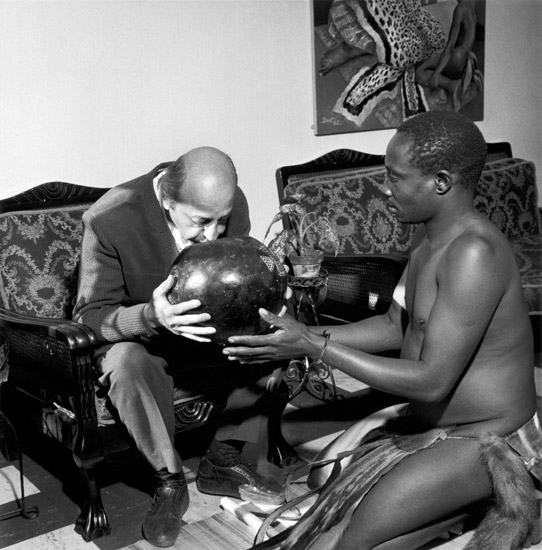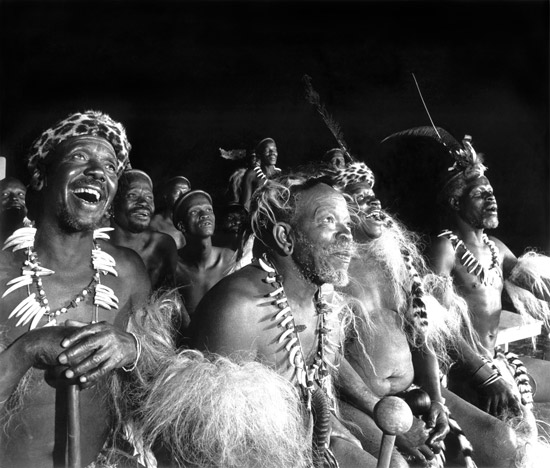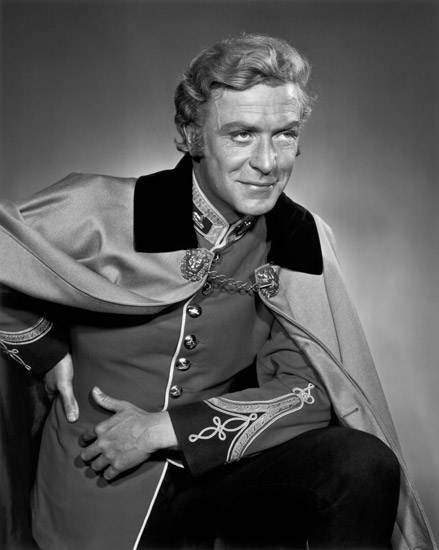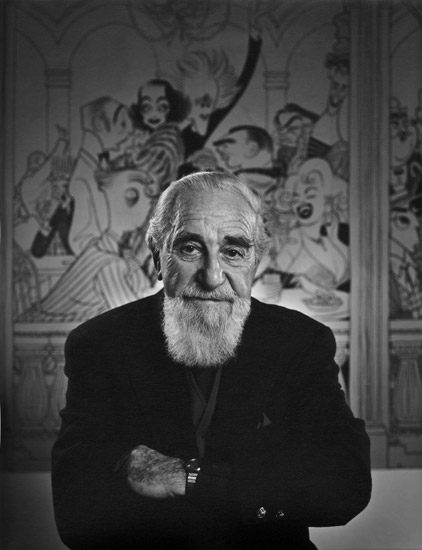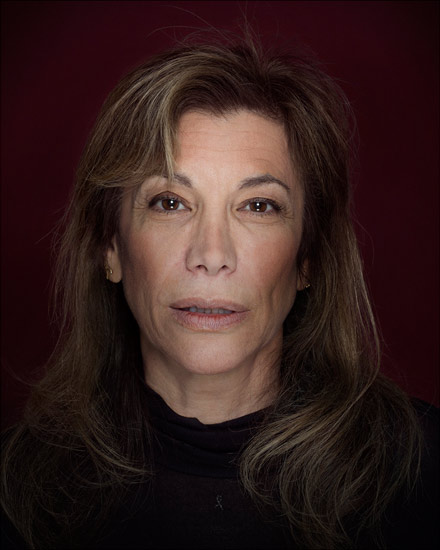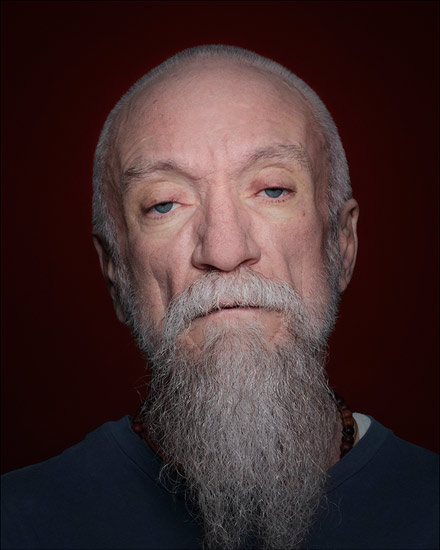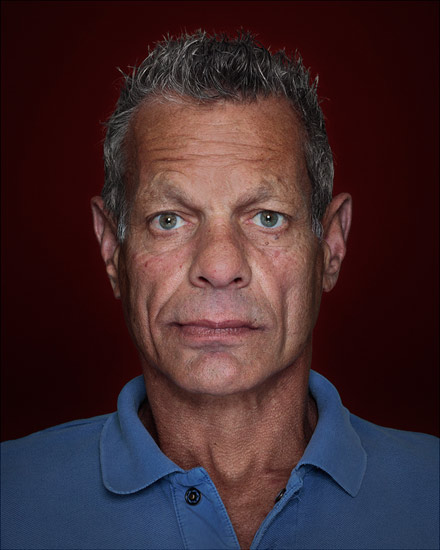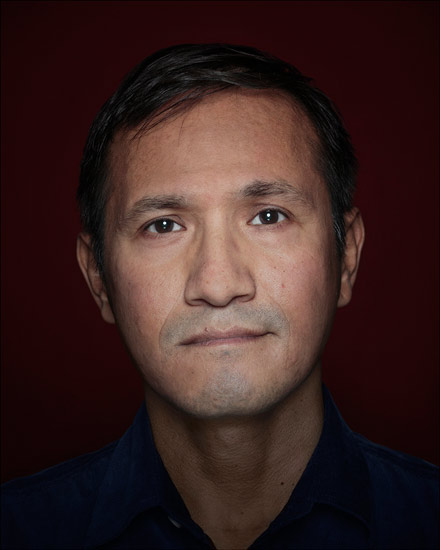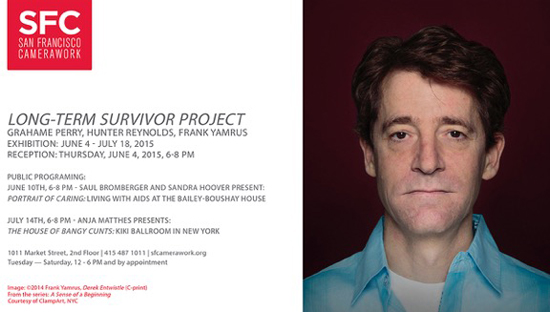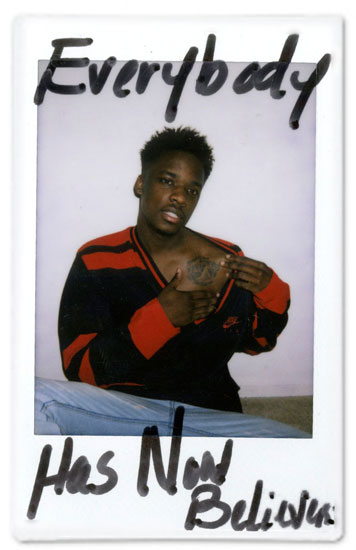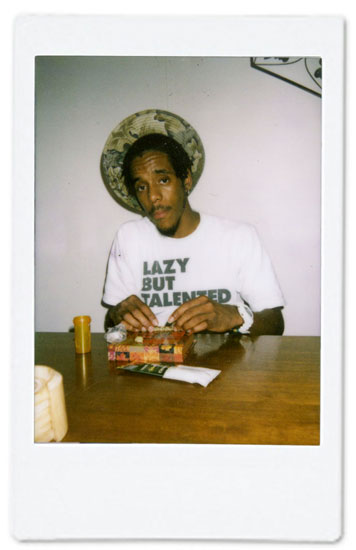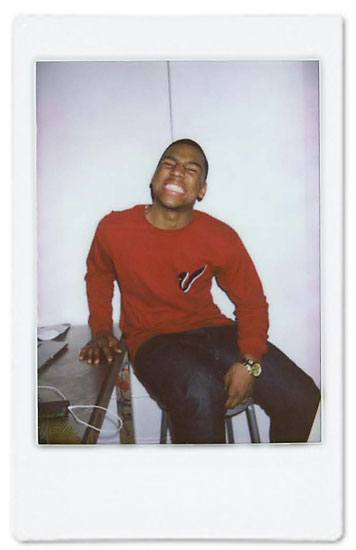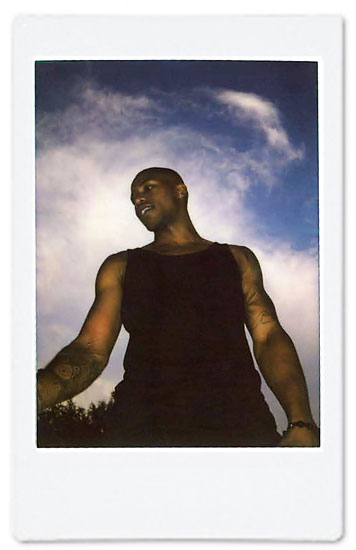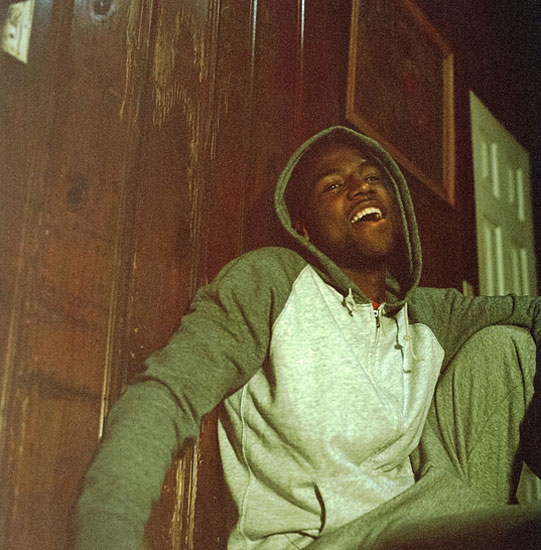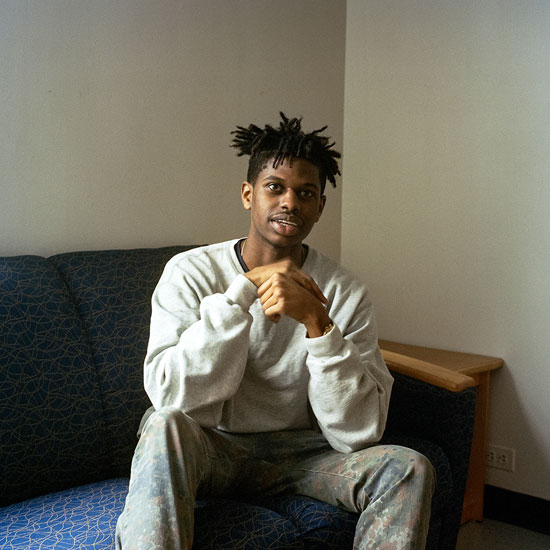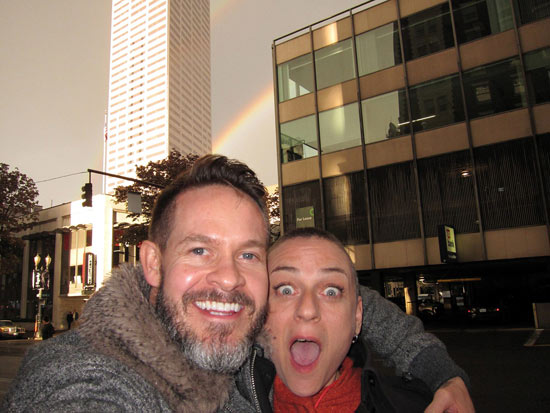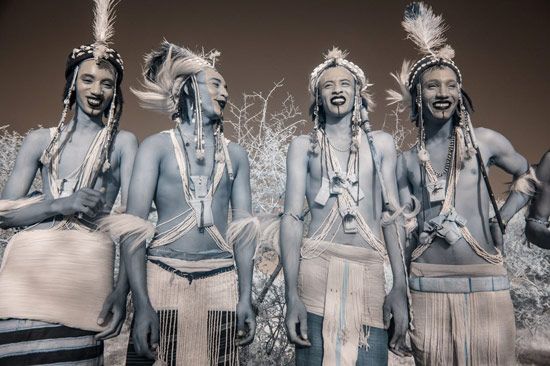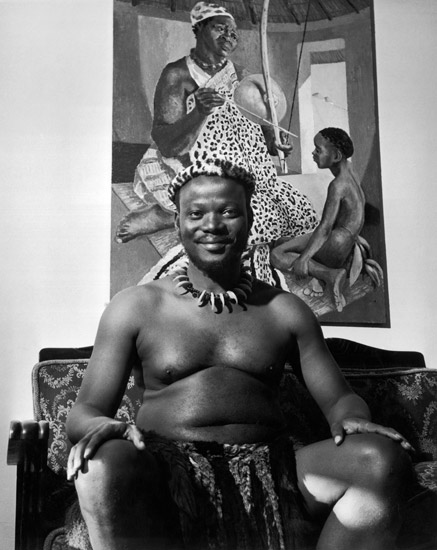
Yousuf Karsh photographed on the set of the 1964-released movie "
Zulu." Future political leader Mangosuthu Buthelezi played Zulu King Cetshwayo kaMpande, his great grandfather. Buthelezi is a South African politician and Zulu tribal leader who founded the Inkatha Freedom Party in 1975 and was Chief Minister of the KwaZulu bantustan until 1994.
Mr Karsh enjoying a ceremony.
Members of Zulu Kingdom watching a movie for the first time.
Michael Caine, 1963 by Yousuf Karsh.

© Kirill Kovalenko
Kirill Kovalenko made these images on the beach in Crimea over the last year - a complicated time for the Republic.
Kirill talks about how "...there is the feeling of a lack of time, as if all those people to come and do what they do solely by inertia or habit. Has already clearly left a past, unknown future, but this all goes on, as if there were no first and second, neither before nor after. What really want these people from life? for the sake of what they live?"
Exploring how people relax during times of such conflict, Kirill has a mischievous eye.
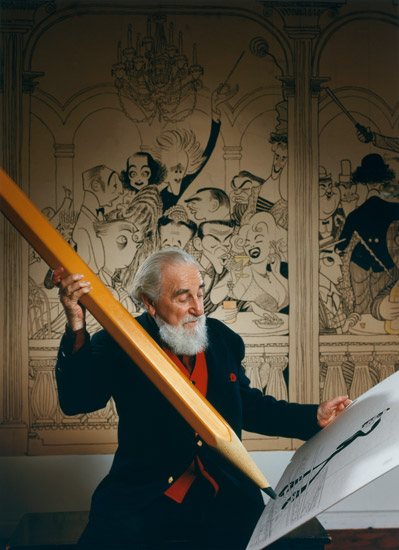
American caricaturist Al Hirschfeld photographed in 1990, by
Yousuf Karsh.
© Yousuf Karsh
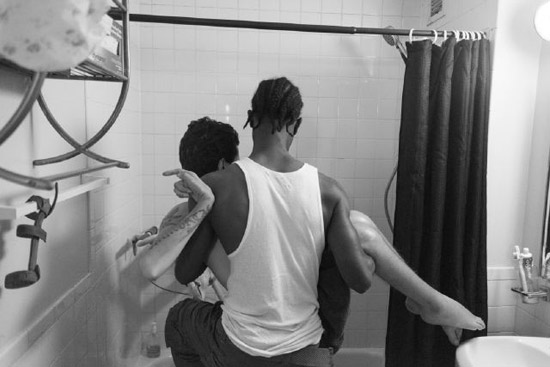
On May 23rd, 2014, news came of in a series of murders committed by a young man in Isla Vista, California, near the campus of University of California, Santa Barbara. Gun violence is a daily occurrence in the United States, but something about this incident tipped
Joe Quint over the edge: he launched "
It Takes Us."
"I happened to glance at that week's issue of People. The cover story was about some Kardashian wedding and there was a little blurb in the upper right corner about the shooting... with a subhead saying 'How could this happen - again?' Now, setting aside the disproportionality in importance of these two stories, I was struck by both the naivety and borderline irresponsibility of that subhead. 'How could it NOT happen again?' was my immediate reaction - why should we be surprised when - despite some small gains made in recent years by the gun violence prevention movement, there had yet to be anything remotely resembling a collective shift in our consciousness on the subject?
"I became increasingly frustrated by inaction - my own, and the inaction of my country. I could no longer simply pay lip service to the importance of reducing the over 32,000 senseless and preventable deaths that take place every year. I want to show how the crisis extends far beyond the typical media narrative of urban violence to include domestic abuse, suicide, children being injured or killed by unsecured guns in their homes, and so many more tragic cases." Joe Quint

Lissa Rivera came strongly recommended by none other than photography expert, author and educator
Katrin Eismann, who is program chair of MPS Digital Photography at New York's School of Visual Arts. When Katrin calls, you listen.
Between them, Lissa Rivera with her partner and muse, "blur the borders of masculinity and femininity... the photographs tap into deep-seated narratives about gender, desire, freedom and taboo."
For me, this lovely series is beguiling. Embracing genderqueerness, using fantasy to explore identity.
"Posed within the relationship of subject to photographer, and the public relationship of the photograph to its viewer, the camera transposes the private realm into public space, converting a private moment into public performance. The fantasy of dressing up transforms the experience of being photographed into one that fuses identity-creation with image-creation. By blurring the borders of masculinity and femininity the photographs tap into deep-seated narratives about gender, desire, freedom and cultural taboo." Lissa Rivera.
The Long Term Survivor Project exhibition opened at
San Francisco Camerawork on June 4th, in celebration of annual Pride month and in honor of National HIV / AIDS Long Term Survivor Day, which was June 5th.
SF Camerawork brings together works by Hunter Reynolds, Grahame Perry and portraits from our pal Frank Yamrus' series, A Sense of a Beginning, to address the experiences of HIV survivorship.
Go see if you are SF-based!
"Frank Yamrus' "A Sense of a Beginning" is a series of solemn and stately portraits of long-term HIV survivors. Through this series Yamrus tells the story of survivorship as manifested not only in the lines and physical attributes of his subjects' faces, which bear subtle testimony to the effects of HIV medications, but also as a factual declaration of presence. Each person depicted in the series is alive today thanks to a complex regimen of medication and years of struggle and determination. Long-term survivorship is a story of countless physician appointments, blood draws, continually shifting drug regimes and constant monitoring of T-cells and viral loads, in the midst of untold grief watching friends and loved ones die. Through the peak years of the struggle against AIDS may have faded into recent memory, survivors live on, bearing the impact of AIDS in their everyday lives."
"By 1991... we were on the front lines of war. We volunteered at various AIDS organizations, joined support groups, and attended fundraisers and many funerals. I became a Shanti Project buddy, helping and witnessing young men die, and worked at the Mt. Zion HIV Clinical Research Center with young men who sacrificed their bodies to help find a cure. As I recall our first decade in San Francisco, I cannot remember much that did not gravitate around AIDS. The words and acronyms that were so foreign to me not long before became embedded in my vernacular. Around this time, my photography transitioned to work about loss as it became the language I knew best. Like others, I analogized the pandemic to war and the early images I made romanticized death as a coping mechanism to deal with overwhelming grief....
"After countless physician appointments, blood draws, continually shifting drug regimes and constant monitoring of T-cells and viral loads, after untold days protesting and untold nights watching friends die, these courageous men and women allow us to examine the aftermath. Gone is the romanticized idea of battle and loss. In its place: the stark reality of years of struggle and fight. This series does not attempt to capture the tenor of those times or the great strides that have been made since. It simply documents survivorship - the physical, psychological and emotional turmoil AIDS has caused over the last 30-plus years." Frank Yamrus.
Imagine my surprise when, upon arriving at Thierry Goldberg Gallery in NYC's lower east side to meet my fellow judge for the Parson's BFA graduate show, it turns out to be Vince Aletti, photography critic for the New Yorker Magazine. After I got over my intimidation, I was thrilled and humbled to chat with Mr. Aletti about the more than 60 graduating artists' work, and even more thrilled when we were in agreement about much of the work on show.
We nominated our winners and each selected a Juror's Choice - mine is
A. Retina Stewart. (Her fabulous real name!)
A. Retina Stewart is Houston-born, now living and working in New York. Her short documentary is a classic; it explores the lives of underground hip hop musicians, their goals and personal endeavors. Stewart highlights the young men's struggles against the pressure to be hyper-masculine and portray a young-black-male stereotype.
"Selling drugs is NOT part of our culture. That's the situation we were put in. If we could have went to Yale, we would have. People move drugs into our streets. We are survivors. We didn't get the same opportunities... we made it work."
Genesis Iver, 2014
Carpe D, 2014
Frank McFly, 2014
Jevon Doe, 2014
"Male African-American hip hop musicians are notoriously perceived to uphold hypermasculine standards; which creates a commercialized persona. Through an intimate interview in each artist's bedroom, Stewart explores them on a more dimensional and nuanced level, delving into their ambitions, insecurities, and fears." A. Retina Stewart
Josh, 2015
Frank McFly, 2015
Donteze, 2015
In a piece on
Afropunk, Stewart proudly, rightfully states "I have mastered the art of finding gold within people, and that's a jewel that school can't teach."
Follow Stewart on Instagram: _arstewart
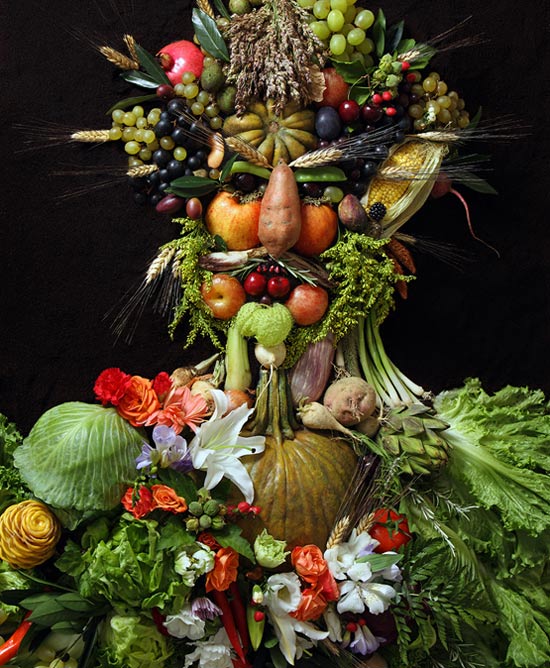 "Vertumnus" © Klaus Enrique
"Vertumnus" © Klaus Enrique
Klaus Enrique's own exuberance is evident in this series of photographs in which he pays homage to the Italian portraitist
Arcimboldo in spectacular style. Referencing both the 16th century master's own works as well as updating his subjects to reflect cultural and political concerns, Klaus' images are highly detailed, impassioned, and splendidly executed.
Klaus grew up in Mexico City. He studied genetics at the University of Nottingham, UK, and received an MBA from Columbia Business School, US. Most of his working career was spent as a freelance IT consultant before he turned to sculpture and photography, which he studied at Parsons and at the School of Visual Arts, in New York. We met at the outstanding
Photolucida Portfolio Reviews in April, 2015. Klaus had the foresight to email me beforehand, and included one of his images, saying he was looking forward to meeting me. Simple things like this make me happy, especially when the work is this compelling!
Bonus Gandhi! © Klaus Enrique
aCurator and Klaus Enrique under a triple rainbow. April, 2015, Portland, Oregon. Thank you Photolucida! 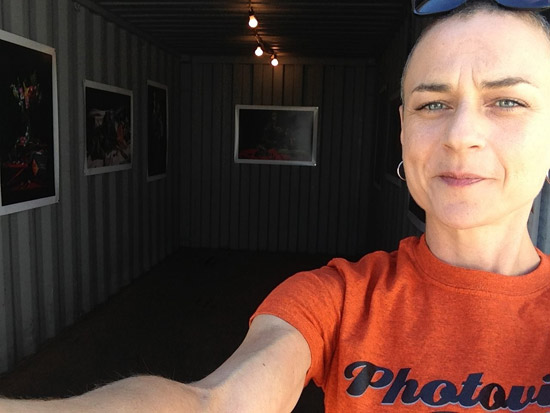
I can help you get the best out of your photographs, improve and develop your work and how you present yourself.
I am a consultant and curator who has been in the photography industry for 25 years. If you are looking for help with editing; sequencing; your website, or online presence; help with a contract, or to talk through a project or concern, I can help.
In 1992 I moved from London to New York to run an international photo agency representing 400+ photographers. I left in 2006 and took the archive of
Yousuf Karsh with me to continue clearing rights for his iconic photographs. I edit and publish
aCurator magazine, and
aCurator blog, which was cited both by the British Journal of Photography and LIFE in their reviews of influencers and taste-makers. For two years I was associate director at
ClampArt fine art gallery. I now consult and review work for photographers of all levels and styles.
Selected Interviews
Miss Rosen Interview from the 2010 launch of aCurator Magazine
Selected judging, reviewing, curation
PhotoNOLA Curated their annual exhibition, and portfolio reviews
Testimonials
"Julie was extremely helpful in editing and sequencing my project. She has an incisive eye, a forthright manner and a wonderful sensibility. She clearly addressed all of my concerns, and she gave me valuable advice for improving my project statement. Talking with her on the phone was the best part of the process. Julie went above and beyond in her efforts, and I'm delighted to give her my highest recommendation."
Stan Raucher, photographer.
Image Troopers. I mentor two fabulous women who live in Norway. We met up in London for two 3-hour sessions and they blogged about it.
"Marco and I thought that our talk was very productive and hands-on where appropriate. You equally provided plenty of food for thought and insight that will help us move forward and focus on areas that require improvements/changes. This feels exciting, so thank you!"
Hanni Cerutti, photographer
"Really, not to sound overly gushy or anything, but you are my favorite reviewer... so much fun, such great energy, so much information to generously share in such a straight forward and honest manner. Some people just get it when they look at work, and then they have the confidence to trust their instincts. You are one of those rare few. Thank you!!!"
Stephen Tomasko, photographer
"Grahame is a curator with a flawless eye and, in her assessment of the work she presents, an immediately trustworthy, no-frills tone... aCurator's triumph is a clarity of purpose wedded to a keen intelligence, and a willingness to let its stunning photographs largely speak for themselves."
Life.com
"I have worked with Julie for a number of years and consider myself very fortunate to have her as a colleague. Everything she takes on - small or large, simple or complex - is done with an efficient mix of good judgement, humor, and competence. I am happy to recommend her without any qualifications." Jerry Fielder, Curator and Director,
Estate of Yousuf Karsh.
"I never knew what a bad editor I was... I am truly grateful for all your insights." Anon.
The basics
$175: Edit and sequence up to 100 images
For your website, call for entries, book layout, etc.
I can help determine how many images should be in your final edit.
Add 10 minutes phone or Skype for an extra $25.
$250: One hour consult by phone or Skype
An hour can be very productive.
Clients often return for a second hour after taking on suggested tasks or revisions.
Basics don't fit your needs? With 25 years in the photography industry under my belt, I bring a variety of experience.
Repeat clients can contact me for reduced rates.

